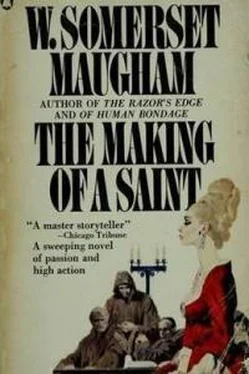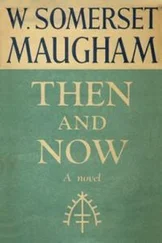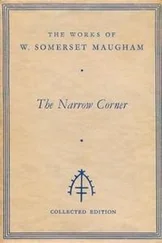Уильям Моэм - The Making of a Saint
Здесь есть возможность читать онлайн «Уильям Моэм - The Making of a Saint» весь текст электронной книги совершенно бесплатно (целиком полную версию без сокращений). В некоторых случаях можно слушать аудио, скачать через торрент в формате fb2 и присутствует краткое содержание. Год выпуска: 2014, Издательство: epubBooks Classics, Жанр: Классическая проза, на английском языке. Описание произведения, (предисловие) а так же отзывы посетителей доступны на портале библиотеки ЛибКат.
- Название:The Making of a Saint
- Автор:
- Издательство:epubBooks Classics
- Жанр:
- Год:2014
- ISBN:нет данных
- Рейтинг книги:5 / 5. Голосов: 1
-
Избранное:Добавить в избранное
- Отзывы:
-
Ваша оценка:
- 100
- 1
- 2
- 3
- 4
- 5
The Making of a Saint: краткое содержание, описание и аннотация
Предлагаем к чтению аннотацию, описание, краткое содержание или предисловие (зависит от того, что написал сам автор книги «The Making of a Saint»). Если вы не нашли необходимую информацию о книге — напишите в комментариях, мы постараемся отыскать её.
The Making of a Saint — читать онлайн бесплатно полную книгу (весь текст) целиком
Ниже представлен текст книги, разбитый по страницам. Система сохранения места последней прочитанной страницы, позволяет с удобством читать онлайн бесплатно книгу «The Making of a Saint», без необходимости каждый раз заново искать на чём Вы остановились. Поставьте закладку, и сможете в любой момент перейти на страницу, на которой закончили чтение.
Интервал:
Закладка:
But, besides that, I was filled with a great sense of pleasure because I was at last free. I felt that if some slight chain still bound me to Giulia now, even that was broken and I had recovered my liberty. There was no love this time. There was a great desire for the magnificent sensual creature, with the lips deep red and heavy; but it left my mind free. I was now again a complete man; and this time I had no Nemesis to fear.
XVIII
And so my life went on for a little while, filled with pleasure and amusement. I was contented with my lot, and had no wish for change. The time went by, and we reached the first week in April. Girolamo had organised a great ball to celebrate the completion of his Palace. He had started living in it as soon as there were walls and roof, but he had spent years on the decorations, taking into his service the best artists he could find in Italy; and now at last everything was finished. The Orsi had been invited with peculiar cordiality, and on the night we betook ourselves to the Palace.
We walked up the stately staircase, a masterpiece of architecture, and found ourselves in the enormous hall which Girolamo had designed especially for gorgeous functions. It was ablaze with light. At the further end, on a low stage, led up to by three broad steps, under a daïs, on high–backed, golden chairs, sat Girolamo and Caterina Sforza. Behind them, in a semicircle, and on the steps at each side, were the ladies of Caterina's suite, and a number of gentlemen; at the back, standing like statues, a row of men–at–arms.
'It is almost regal!' said Checco, pursing up his lips.
'It is not so poor a thing to be the Lord of Forli,' answered Matteo. Fuel to the fire!
We approached, and Girolamo, as he saw us, rose and came down the steps.
'Hail, my Checco!' he said, taking both his hands. 'Till you had come the assembly was not complete.'
Matteo and I went to the Countess. She had surpassed herself this night. Her dress was of cloth of silver, shimmering and sparkling. In her hair were diamonds shining like fireflies in the night; her arms, her neck, her fingers glittered with costly gems. I had never seen her look so beautiful, nor so magnificent. Let them say what they liked, Checco and Matteo and the rest of them, but she was born to be a queen. How strange that this offspring of the rough Condottiere and the lewd woman should have a majesty such as one imagines of a mighty empress descended from countless kings.
She took the trouble to be particularly gracious to us. Me she complimented on some verses she had seen, and was very flattering in reference to a pastoral play which I had arranged. She could not congratulate my good Matteo on any intellectual achievements, but the fame of his amours gave her a subject on which she could playfully reproach him. She demanded details, and I left her listening intently to some history which Matteo was whispering in her ear; and I knew he was not particular in what he said.
I felt in peculiarly high spirits, and I looked about for someone on whom to vent my good humour. I caught sight of Giulia. I had seen her once or twice since my return to Forli, but had never spoken to her. Now I felt sure of myself; I knew I did not care two straws for her, but I thought it would please me to have a little revenge. I looked at her a moment. I made up my mind; I went to her and bowed most ceremoniously.
'Donna Giulia, behold the moth!' I had used the simile before, but not to her, so it did not matter.
She looked at me undecidedly, not quite knowing how to take me.
'May I offer you my arm,' I said as blandly as I could.
She smiled a little awkwardly and took it.
'How beautiful the Countess is to–night!' I said. 'Everyone will fall in love with her.' I knew she hated Caterina, a sentiment which the great lady returned with vigour. 'I would not dare say it to another; but I know you are never jealous: she is indeed like the moon among the stars.'
'The idea does not seem too new,' she said coldly.
'It is all the more comprehensible. I am thinking of writing a sonnet on the theme.'
'I imagined it had been done before; but the ladies of Forli will doubtless be grateful to you.'
She was getting cross; and I knew by experience that when she was cross she always wanted to cry.
'I am afraid you are angry with me,' I said.
'No, it is you who are angry with me,' she answered rather tearfully.
'I? Why should you think that?'
'You have not forgiven me for—'
I wondered whether the conscientious Giorgio had had another attack of morality and ridden off into the country.
'My dear lady,' I said, with a little laugh, 'I assure you that I have forgiven you entirely. After all, it was not such a very serious matter.'
'No?' She looked at me with a little surprise.
I shrugged my shoulders.
'You were quite right in what you did. Those things have to finish some time or other, and it really does not so much matter when.'
'I was afraid I had hurt you,' she said in a low voice.
The scene came to my mind; the dimly–lit room, the delicate form lying on the couch, cold and indifferent, while I was given over to an agony of despair. I remembered the glitter of the jewelled ring against the white hand. I would have no mercy.
'My dear Giulia—you will allow me to call you Giulia?'
She nodded.
'My dear Giulia, I was a little unhappy at first, I acknowledge, but one gets over those things so quickly—a bottle of wine, and a good sleep: they are like bleeding to a fever.'
'You were unhappy?'
'Naturally; one is always rather put out when one is dismissed. One would prefer to have done the breaking oneself.'
'It was a matter of pride?'
'I am afraid I must confess to it.'
'I did not think so at the time.'
I laughed.
'Oh, that is my excited way of putting things. I frightened you; but it did not really mean anything.'
She did not answer. After a while I said,—
'You know, when one is young one should make the most of one's time. Fidelity is a stupid virtue, unphilosophical and extremely unfashionable.'
'What do you mean?'
'Simply this; you did not particularly love me, and I did not particularly love you.'
'Oh!'
'We had a passing fancy for one another, and that satisfied there was nothing more to keep us together. We should have been very foolish not to break the chain; if you had not done so, I should have. With your woman's intuition, you saw that and forestalled me!'
Again she did not answer.
'Of course, if you had been in love with me, or I with you, it would have been different. But as it was—'
'I see my cousin Violante in the corner there; will you lead me to her?'
I did as she asked, and as she was bowing me my dismissal I said,—
'We have had a very pleasant talk, and we are quite good friends, are we not?'
'Quite!' she said.
I drew a long breath as I left her. I hoped I had hurt; I hoped I had humiliated her. I wished I could have thought of things to say that would have cut her to the heart. I was quite indifferent to her, but when I remembered—I hated her.
I knew everyone in Forli by now, and as I turned away from Giulia I had no lack of friends with whom to talk. The rooms became more crowded every moment. The assembly was the most brilliant that Forli had ever seen; and as the evening wore on the people became more animated; a babel of talk drowned the music, and the chief topic of conversation was the wonderful beauty of Caterina. She was bubbling over with high spirits; no one knew what had happened to make her so joyful, for of late she had suffered a little from the unpopularity of her husband, and a sullen look of anger had replaced the old smiles and graces. But to–night she was herself again. Men were standing round talking to her, and one heard a shout of laughter from them as every now and then she made some witty repartee; and her conversation gained another charm from a sort of soldierly bluntness which people remembered in Francesco Sforza, and which she had inherited. People also spoke of the cordiality of Girolamo towards our Checco; he walked up and down the room with him, arm in arm, talking affectionately; it reminded the onlookers of the time when they had been as brothers together. Caterina occasionally gave them a glance and a little smile of approval; she was evidently well pleased with the reconciliation.
Читать дальшеИнтервал:
Закладка:
Похожие книги на «The Making of a Saint»
Представляем Вашему вниманию похожие книги на «The Making of a Saint» списком для выбора. Мы отобрали схожую по названию и смыслу литературу в надежде предоставить читателям больше вариантов отыскать новые, интересные, ещё непрочитанные произведения.
Обсуждение, отзывы о книге «The Making of a Saint» и просто собственные мнения читателей. Оставьте ваши комментарии, напишите, что Вы думаете о произведении, его смысле или главных героях. Укажите что конкретно понравилось, а что нет, и почему Вы так считаете.











